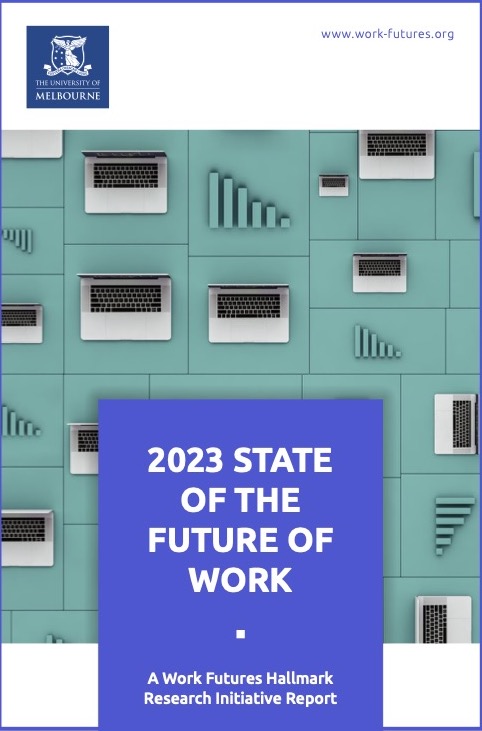The Work Futures Hallmark Research Initiative aims to foster our understanding of how the future of work is changing. We explore how technologies such as artificial intelligence, automation and digital platforms are profoundly shaping the nature of work, workplaces and working lives.
About
Work as we know it, the nine-to-five, standard form of employment with fair working conditions, has become the exception rather than the norm. In its place, precarious and uncertain work has emerged as technologies like artificial intelligence, automation and the digital platform economy are displacing workers, disrupting workplaces, and irrevocably changing peoples’ working lives.
In many ways, the COVID-19 pandemic has accelerated some of these changes – most notably the transition to remote work. For many, COVID-19 changed how we work, where we work and whose work is most impacted by technological advancement. Many workers are no longer shackled to offices and are working remotely from home, out of the line of sight of managers.
Others have experienced greater unemployment, underemployment and precarity because their jobs have disappeared or require physical presence made difficult by the erasure of in-person school and childcare. The impact of all these changes cuts across gender, class, race, and ethnicity, however, they are more pronounced among disadvantaged populations, highlighting the impact of the digital divide on our respective work futures.
The Work Futures Hallmark Research Initiative aims to foster our understanding of how the future of work is changing. We explore how technologies such as artificial intelligence, automation and digital platforms are profoundly shaping the nature of work, workplaces and working lives.
The initiative brings together world-leading scholars across six research faculties and schools within the University to develop research synergies and multidisciplinary approaches to understanding and responding to major issues of work futures. Critically, drawing from the depth of Australian and international expertise with the University, the Work Futures HRI aims to develop evidence-based best-practice approaches for industries and governments as they prepare for the future of work.
Objectives
The Hallmark has three main objectives.
- To broaden and deepen existing collaborations across the University, and to bring together researchers who have not collaborated before with the aim of generating new knowledge and linkages across disciplines and faculties.
- To foster a network of next generation scholars on work futures by integrating higher degree students as well as early career researchers across the University to participate in the Hallmark’s thematic area, build critical research skills and develop linkages to our industry partners.
- To develop an active and robust research translation and engagement strategy to ensure key research insights generated from this grouping of leading scholars within the Hallmark is disseminated widely and has an impact beyond the University.
Research themes
The Work Futures Hallmark Research Initiative addresses three main research themes.
Theme 1: The Digital Distribution of Work
This research theme provides key insights into how technology is reshaping work, work opportunities and work organisation. This theme explores how the adoption of automation and artificial intelligence and the movement towards greater gig work by industry are impacting the future of work. We investigate how emerging technologies positioned to disrupt employment in Australia to understand which industries are closest to major employment changes and how these technological changes intersect with spatial and social determinants of work.
Theme 2: The Spatial Distribution of Work
This research theme investigates the changing distribution of work across Australia. This research stream focuses on the spatial distribution of work across Victoria paying careful attention to Melbourne CBD, the outlying suburbs, and regional Victoria. It also explores the role of government and workplace policies to understand whether existing policy and legal frameworks are sufficient to address the changing needs of the Australian workforce and employers.
Theme 3: The Social and Economic Impact of these Changes
The changes associated with the future of work will have disparate impacts across different groups of the population. This research theme explores the intersections of race, gender, education, class and indigeneity on the digital and spatial distribution of work. This research deepens our understanding of how changes in technologies and infrastructure will differentially impact specific populations, with a particular focus on priority cohorts.
The Work Futures Hallmark Initiative brings together University of Melbourne researchers and industry partners across these three theme areas on a number of fora. This includes workshops and seed funded research projects to develop innovative, multidisciplinary connections to act as a springboard for industry engagement and future funding.
Collaborations and projects funded by our seed funding rounds across these three themes will serve as the foundation for an annual report on the State of Work Futures in Australia.
Publications
Read the first report from the Work Futures Hallmark – the 2023 State of the Future of Work Report.
People
Initiative chair
Professor Leah Ruppanner
Professor
Social and Political Sciences
Steering Committee
Professor Susan Ainsworth
Professor in Organisational Studies
Management and Marketing
Associate Professor Alysia Blackham
Melbourne Law School
Associate Professor David Bissell
Future Fellow
Geography, Earth and Atmospheric Sciences
Professor Jeff Borland
Truby Williams Professor of Economics
Dr Mark Cheong
Senior Lecturer, Information Systems
Computing and Information Systems
Dr Brendan Churchill
Research Fellow
Social and Political Sciences
Associate Professor Michelle Evans
Associate Professor in Leadership
Management and Marketing
Dr Lea Frermann
Lecturer
Computing and Information Systems
Dr Tania King
Senior Research Fellow in Social Epidemiology
Melbourne School of Population and Global Health
Professor Frank Vetere
Professor of Computing and Information Systems
Staff
Kate Dangar
Research Coordinator, Work Futures Research Initiative
Contact us
To get in touch with the Work Futures Hallmark Initiative team please contact research coordinator Kate Dangar by email to: kate.dangar@unimelb.edu.au
First published on 9 May 2022.
Share this article
